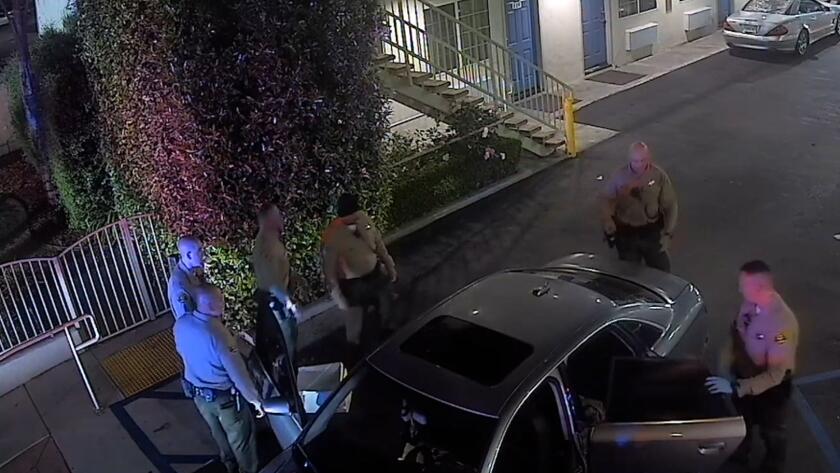A deputy testified falsely. Was he lying or just ‘sloppy’?
In his testimony against two men facing weapons charges, Los Angeles County Sheriff’s Deputy Kevin Honea was clear: While searching a car the men were in, he found a gun in a box in the front seat area. Video footage of the incident showed a different story unfold.
In his testimony against two men facing weapons charges, Los Angeles County Sheriff’s Deputy Kevin Honea was clear: While searching a car the men were in, he had found a gun in a box in the front seat area.
But prosecutors who later watched video footage of the May 2019 stop saw that account was wrong: It was another deputy who had discovered the weapon — in a bag that had been shut away in the trunk.
Honea’s false testimony forced prosecutors to drop the charges, and an attorney for one of the men pressed the Sheriff’s Department to investigate Honea for perjury and filing a report with false information. Both would be crimes and grounds for him to be fired.
Sheriff’s officials, however, chose not to open a criminal investigation, and an internal department inquiry cleared Honea of lying. Investigators concluded he had not meant to mislead anyone, and chalked his misstatements up to sloppiness. He received a 10-day suspension.
The handling of the Honea case by sheriff’s officials highlights a concern that has arisen among criminal justice watchdogs since Sheriff Alex Villanueva took office two years ago. Under Villanueva, the department has investigated fewer allegations of dishonesty, and the number of times deputies have been found guilty of the misconduct has dropped.
Some department watchdogs worry the decline is part of a deliberate effort by Villanueva to shield the agency from the increased public scrutiny brought on by a state law that makes cases of dishonesty and other types of misconduct public.
In response to questions from The Times, Villanueva did not address the lower number of investigations during his time in office but said inconsistent statements that compromise the integrity of deputies are “extremely troubling.”
“I will not tolerate misconduct in any form by our personnel,” Villanueva said in a statement. “These cases will be investigated thoroughly and appropriate administrative action will be taken, as well as criminal action when warranted.”
Villanueva took office in December 2018. That year and in the three previous years, sheriff’s officials investigated between 31 and 59 allegations of dishonesty by deputies, and between 15 and 29 of those charges were substantiated, department figures show. In 2019, 22 allegations of dishonesty were probed, 12 of which were found to be true. And last year the number of times deputies were investigated for dishonesty fell further to 15 through Nov. 10. All but one of those investigations were ongoing.
Those figures include investigations into various types of dishonesty, including tampering with evidence and making false statements. It’s unclear how many deputies are included in the figures, since some may have been charged with more than one violation in an incident.
The landmark law, Senate Bill 1421, which went into effect a month after Villanueva took office, reversed decades of secrecy afforded to police in California by opening up previously confidential records about officers involved in shootings or other serious uses of force, as well as those who committed sexual assaults or acts of dishonesty.
Under the new law, information is made public only if the allegations against the law enforcement officer are found to be true. A finding of dishonesty, especially when made public, can undo an officer’s career. If they are not fired, their credibility is likely to be called into question whenever they testify about an arrest. A dishonest cop can also damage a police department’s reputation in the eyes of the public, making such cases particularly worrisome to sheriffs and police chiefs.
Inspector General Max Huntsman, who oversees the Sheriff’s Department, said that dynamic creates a “dangerous incentive to police agencies to water down charges as a means of maintaining secrecy, which could result in more dishonest police officers being retained rather than fewer.”
In a 2019 report that examined cases in which deputy discipline was downgraded, Huntsman highlighted another case, in which allegations of dishonesty by a deputy were thrown out a few months into Villanueva’s term. The deputy, who had been disciplined repeatedly for prior incidents, was accused of severely choking his wife, instructing her not to cooperate with the department’s investigation and then lying about his actions to investigators.
The deputy, who was not identified in the report, had been relieved of duty and faced being fired by the previous sheriff. Instead, under Villanueva, he was offered a settlement in which the charges of dishonesty and interfering with an investigation were dropped, the report said. The deputy kept his job and was suspended for 25 days for assaulting his wife.
Other large agencies in California have not experienced the same drop in dishonesty cases as the Sheriff’s Department.
In the Los Angeles Police Department, the number of allegations of lying and similar claims ranged from 164 to 201 each year from 2015 to 2018, according to data released by the agency. In 2019, officials logged 194. The number of sustained allegations, however, has declined steadily, from 25 in 2015 to 10 in 2019. Complete figures were not available for 2020.
The LAPD’s figures are likely far higher than the sheriff’s because they include complaints brought by members of the public. The categories that the LAPD uses for dishonesty allegations are not the same as those of the Sheriff’s Department, and not all of its cases are disclosable under SB 1421.
Investigators for the San Francisco Police Department looked into between 12 and 24 allegations of dishonesty by officers each year from 2015 to 2018, according to the Department of Police Accountability. In 2019 there were 16 allegations and 22 through mid-December of 2020. Since 2015, only nine allegations have been sustained.
And the number of dishonesty allegations investigated by the Orange County Sheriff’s Department has remained in the single digits every year except 2018, when there were 13, according to statistics released by the agency.
Since being elected to run the nation’s largest sheriff’s department, Villanueva has been outspoken about his controversial belief that discipline under previous sheriffs was unfair and has vowed to make changes. In his first several months on the job, the Sheriff’s Department closed down dozens of ongoing investigations into deputy misconduct and cut the number of new cases by more than half.
A Sheriff’s Department spokesman said the reduction in dishonesty charges is “yet another example of the incredible organizational culture changes occurring under Sheriff Villanueva.”
The events that led to the perjury complaint against Honea began on a night in May 2019.
Honea, who was assigned to the South L.A. station, was on patrol in Gardena when he saw an Audi sedan leaving a Motel 6 parking lot, according to transcripts of his preliminary hearing testimony reviewed by The Times. He ran the license plate and discovered it was linked to a robbery reported to the Los Angeles Police Department. Three men were arrested.
At a court hearing a month later to determine whether there was sufficient evidence to prosecute the driver of the car and the man who had been riding in front passenger seat, Honea described opening the box in the front passenger’s seat area and finding various items, including the gun.
“It was like where your foot would be if you were sitting in the front passenger seat,” he said, when questioned by the prosecutor.
During cross examination, Deputy Public Defender Alison Hudak asked: “Pertaining to the brown box that is in the front passenger seat, you opened that box, correct?”
“Correct,” he replied, adding that the gun was inside.
She asked soon after, “Did you personally recover the firearm?”
“Yes,” Honea replied.
The judge cited Honea’s testimony when she decided there was enough evidence for the case to proceed to a trial, noting that the firearm was within reach of the driver and at the feet of the front passenger.
Later, the defense team for one of the men obtained the video footage taken from a security camera at the motel.
The video, a copy of which was reviewed by The Times, shows Honea and other deputies looking inside the box that was in the front passenger’s seat several times over the course of about an hour and not finding a gun.
Shortly after 1 a.m., one of several deputies who had responded to the scene pulled a small box out of a bag that had been removed from the trunk of the car. Honea, who was on the phone, walked back toward the group as another deputy opened the box, and the group celebrated, patting each other on the shoulders.
Without identifying Honea by name, Lt. John Satterfield, a Sheriff’s Department spokesman, said sheriff’s investigators concluded the deputy was unaware his testimony was false. The deputy knew he was being recorded by security cameras, Satterfield said.
“The deputy in question was sloppy in their investigation and made incorrect assumptions regarding the location of the weapon, which led them to make those same incorrect assumptions in court,” Satterfield said.
Citing privacy laws, Satterfield declined to name Honea specifically but said the 10-day suspension handed down in the case was appropriate.
The deputy’s attorney, Bill Hadden, declined to comment other than to say that Honea is a well-regarded deputy whose supervisors call him reliable and hardworking and that he has had no other prior discipline in his several years in the department.
On the day in October that The Times asked about the gun case involving Honea , the district attorney’s Justice System Integrity Division, which reviews allegations of police misconduct, opened a formal inquiry into the matter, a spokesman said.
The deputy has been listed as a potential witness in criminal cases more than 240 times since he joined the Sheriff’s Department in 2015, according to records The Times obtained through public records act requests. Of those cases, about 45 were filed after he testified in the gun case.
Hudak, the deputy public defender, said her client spent more than four months in custody because of Honea’s false report and testimony.
“His dishonesty was rewarded every time someone in authority accepted his representations as true,” she said. “The fact that this evidence was presented to the sheriff and district attorney and that Deputy Honea is still working in a position of trust reinforces his bad behavior. There should never be any room in any police agency for a peace officer who lies.”
More to Read
Sign up for Essential California
The most important California stories and recommendations in your inbox every morning.
You may occasionally receive promotional content from the Los Angeles Times.












